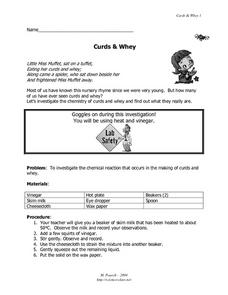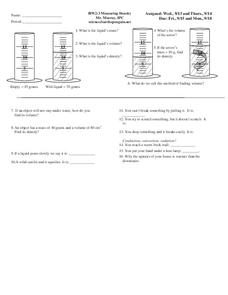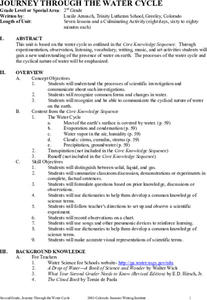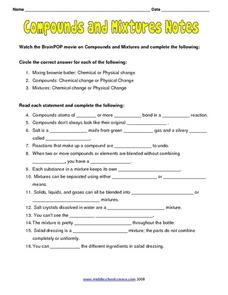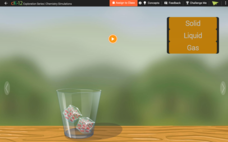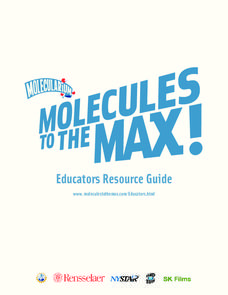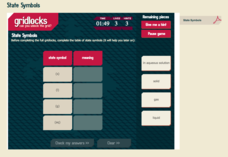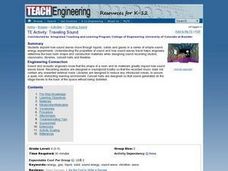Curated OER
Curds and Whey
In this chemical reaction worksheet, students investigate the reaction that makes curds and whey. They mix milk and vinegar and run it through cheesecloth to collect the solid. Students make observations, read about curds and whey, and...
Curated OER
Measuring Density
In this density learning exercise, high schoolers answer 16 questions related to density. They read diagrams of graduated cylinders and determine the liquid's mass, volume and density. They find the density of objects and answer 3...
Curated OER
Density - An Introduction
Students experiment with objects of different densities. In this density lesson, students examine same-sized objects with different weights, then look at a teacher explanation of density. Students make wave bottles and a density jar to...
Curated OER
Electricity: Will It Conduct?
Students build conductivity testers and investigate which solids and solutions conduct electricity. Working in groups, they predict which items will conduct electricity and record their answers on worksheets.
Curated OER
Trash Bashing
Students define trash, garbage, or solid waste, discuss ways of disposing of trash, list examples of biodegradable materials, and have trash relay race in order to sort trash into appropriate containers labeled biodegradable, reusable,...
Curated OER
What's the Matter?
Students investigate matter. For this matter lesson, students identify types of matter and characteristics of each type. Students discuss matter and create matter posters to show understanding.
Curated OER
Facts of Matter
Students make group decisions about matter as they explore and interpret many types.
Curated OER
Journey Through the Water Cycle
Students canvass the water cycle in the seven lessons of this unit. The processes of the water cycle and the cyclical nature of water is emphasized inthis unit.
Curated OER
Compounds and Mixtures Notes
In this matter learning exercise, students watch a movie and then compare the differences between compounds and mixtures. This learning exercise has 16 fill in the blank questions.
US Geological Survey
The Water Cycle — A Placemat for Kids
What better time to reinforce a concept than when you're eating? Boost scholars' knowledge of the water cycle with an eye-catching placemat featuring playful raindrops and bright colors.
American Chemical Society
Float and Sink
We're not talking about the kitchen sink. Learners explore what types of objects sink and float in water in an inquiry-based instructional activity. With experimentation, they find similarities between materials that float and those that...
PBS
The 3 Phases | Phases of Matter | UNC-TV Science
Explore the states of matter without the mess or expensive equipment in a compact, informative activity. Scientists watch as the narrator explains the three states of matter using a glass of ice and soda in an animated video that...
PBS
Phase Changes | Phases of Matter | UNC-TV Science
Take an energetic ride through the phase changes of a water molecule in a compact activity. Young scientists learn about the phases of matter and discover the role of thermal energy in governing phase changes while watching a short...
CK-12 Foundation
It's Just a Phase
Explore the phases of water as temperature rises. Pupils consider the idea that temperature remains constant during each phase change. An interactive exercise allows your young scientists to observe the temperature and molecular motion...
CK-12 Foundation
What's the Matter?
What makes ice, water, and steam different? Their molecular arrangements are the same, but their movements are different. Individuals make this conclusion by completing the simulation activity.
Concord Consortium
Specific Heat and Latent Heat in Condensation
There's more to melting than meets the eye! Junior physical chemists investigate the differences between specific and latent heats as a substance undergoes a phase change. Users remove heat from the system and observe changes in kinetic...
Rensselaer Polytechnic Institute
Molecules to the Max!—Educators Resource Guide
From molecules to nanotubes, an engaging unit explores the world of tiny science. Fifteen hands-on experiments and lessons engage young scientists as they learn chemistry. Discussions, worksheets, and data analysis reinforce the concepts...
Royal Society of Chemistry
State Symbols
When water is a solvent in a chemical equation, we consider it an aqueous solution. Scholars match the name of four states of matter to their proper symbol in a chemical equation. Four puzzles provide repetition to help pupils remember...
American Chemical Society
Matter Is Made of Tiny Particles
Believe in the invisible and convince the class that tiny particles exist even if they can't see them! A thorough lesson investigates all phases of matter and provides pupils hands-on experiences that demonstrate that all matter is made...
Curated OER
Melt the Ice
Students examine and discuss how water changes from a liquid to a solid to a gas. They explore this concept by having an ice cube race, competing to see which group can change the solid water back into liquid water first.
Utah LessonPlans
Water Magicians
Students observe water changing states from a solid to a liquid to a gas.
Curated OER
Traveling Sound
Students explore how sound waves move through liquids, solids and gases in a series of simple sound energy experiments. They describe how sound needs molecules to move and that changing the medium that it travels through changes the...
Curated OER
Measuring Water Vapor: The Microwave Water Radiometer (MWR)
Students investigate water vapor. They view and analyze photos, conduct Internet research, and analyze the total water vapor/total liquid water data plot.
Curated OER
Oobleck
Students examine states of matter. In this solids and liquids lesson, students conduct a scientific investigation that requires them to make oobleck and record their observations pertaining to it.
Other popular searches
- Liquids and Solids
- Solids Liquids and Gases
- Solids Liquids Gases
- Solids, Liquids, Gases
- Solids, Liquids and Gases
- Solids Liquids Gas
- Pictures Solids Liquids Gas
- Solids, Liquids, and Gases
- Solids Liquids and Gas
- Solids Liquids Gases Quiz
- Matter Solids Liquids
- Liquids Solids


